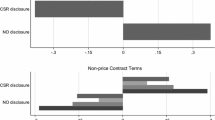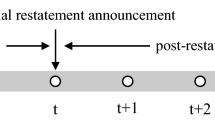Abstract
We examine whether investors value the disclosure of first-time standalone corporate social responsibility (CSR) reports, and whether market valuations differ between government-controlled and privately controlled firms. Using a matched sample of Chinese publicly listed firms, we find that CSR initiators have higher market valuations than matched CSR non-initiators, and CSR initiators controlled by the central and local governments have lower market valuations than CSR non-initiators and CSR initiators controlled by private shareholders. Additional analyses demonstrate that CSR initiators with high CSR reporting quality and perceived credibility have higher market valuations than CSR initiators with low CSR reporting quality and medium or low perceived credibility of CSR reporting. We do not find convincing evidence that CSR mandate, litigation risk, and prior stock returns affect market reactions to CSR reporting. Overall, we find that the market values standalone CSR reports, and that CSR reporting quality and perceived credibility are important factors in market valuation.

Similar content being viewed by others
Notes
For example, in its 2012 CSR report, China Railway Engineering Corporation explicitly lists investors as one of the principal parties considered in its CSR management.
One example is the melamine contamination incident in 2008. Sanlu Corporation, one of China’s largest dairy manufacturers, admitted its products had been contaminated by the toxic chemical melamine. A subsequent report revealed the shocking fact that the top management of the dairy companies involved had been aware of this issue long before the scandal was exposed but continued to provide contaminated dairy products.
We address the concern that the signaling effect of standalone CSR reports may not be applicable to mandatory CSR disclosure in “CSR Disclosure Mandate and Market Valuation of CSR Reporting” section.
Twenty-eight firms disclose their ultimate controlling shareholders as SOEs. We manually identified whether these SOEs are controlled by the central government or local governments based on information we obtained from the websites of the SOEs or SASAC.
References
Atanasov, V., Black, B., Ciccotello, C., & Gyoshev, S. (2010). How does law affect finance? An examination of equity tunneling in Bulgaria. Journal of Financial Economics, 96, 155–173.
Bachoo, K., Tan, R., & Wilson, M. (2013). Firm value and the quality of sustainability reporting in Australia. Australian Accounting Review, 23, 67–87.
Ball, R., & Brown, P. (1968). An empirical evaluation of accounting income numbers. Journal of Accounting Research, 6, 159–178.
Ballou, B., Heitger, D. L., & Landes, C. E. (2006). The future of corporate sustainability reporting: A rapidly growing assurance opportunity. Journal of Accountancy, 202, 65–74.
Beaver, W. H. (1968). The information content of annual earnings announcements. Journal of Accounting Research, 6, 67–92.
Berthelot, S., Coulmont, M., & Serret, V. (2012). Do investors value sustainability reports? A Canadian study. Corporate Social Responsibility and Environmental Management, 19, 355–363.
Blay, A. D., & Geiger, M. A. (2001). Market expectations for first-time going-concern recipients. Journal of Accounting, Auditing & Finance, 16, 209–226.
Brown, S. J., & Warner, J. B. (1985). Using daily stock returns: The case of event studies. Journal of Financial Economics, 14, 3–31.
Campbell, J. L. (2007). Why would corporations behave in socially responsible ways? An institutional theory of corporate social responsibility. Academy of Management Review, 32, 946–967.
Campbell, J. Y., Lo, A. W., & MacKinlay, A. C. (1997). The econometrics of financial markets. Princeton, New Jersey: Princeton University Press.
Cao, Z., & Narayanamoorthy, G. S. (2011). The effect of litigation risk on management earnings forecasts. Contemporary Accounting Research, 28, 125–173.
Chen, G., Firth, M., Gao, D. N., & Rui, O. M. (2005). Is China’s securities regulatory agency a toothless tiger? Evidence from enforcement actions. Journal of Accounting and Public Policy, 24, 451–488.
Chen, G., Firth, M., & Xu, L. (2009). Does the type of ownership control matter? Evidence from China’s listed companies. Journal of Banking & Finance, 33, 171–181.
China WTO Tribune. (2010). Research on corporate social responsiblity reporting in China 2010. China WTO Tribune, http://www.csrreport.cn.
Clarke, D., Murrell, P., & Whiting, S. (2008). The role of law in China’s economic development. In L. Brandt & T. Rawski (Eds.), China’s great economic transformation (pp. 375–428). Cambridge: Cambridge University Press.
Clarkson, M. E. (1995). A stakeholder framework for analyzing and evaluating corporate social performance. Academy of Management Review, 20, 92–117.
Clarkson, P., Fang, X., Li, Y., Richardson, G.D., (2010). The relevance of environmental disclosures for investors and other stakeholder groups: Are such disclosures incrementally informative?, Working Paper, University of Queensland.
Dhaliwal, D. S., Li, O. Z., Tsang, A., & Yang, Y. G. (2011). Voluntary nonfinancial disclosure and the cost of equity capital: The initiation of corporate social responsibility reporting. The Accounting Review, 86, 59–100.
Diamond, D. W., & Verrecchia, R. E. (1991). Disclosure, liquidity, and the cost of capital. Journal of Finance, 46, 1325–1359.
Easton, P. D., Harris, T. S., & Ohlson, J. A. (1992). Aggregate accounting earnings can explain most of security returns: The case of long return intervals. Journal of Accounting and Economics, 15, 119–142.
Fama, E. F., & French, K. R. (1993). Common risk factors in the returns on stocks and bonds. Journal of Financial Economics, 33, 3–56.
Francis, J., Philbrick, D., & Schipper, K. (1994). Shareholder litigation and corporate disclosures. Journal of Accounting Research, 32, 137–164.
Freeman, R. E. (2010). Strategic management: A stakeholder approach. Cambridge : Cambridge University Press.
Gao, Y. (2009). Corporate social performance in China: Evidence from large companies. Journal of Business Ethics, 89, 23–35.
Griffin, P., & Sun, Y. (2013). Going green: Market reaction to CSR newswire releases. Journal of Accounting and Public Policy, 32, 93–113.
Guidry, R. P., & Patten, D. M. (2010). Market reactions to the first-time issuance of corporate sustainability reports: Evidence that quality matters. Sustainability Accounting, Management and Policy Journal, 1, 33–50.
Harvey, B. (1999). Graceful merchants: A contemporary view of Chinese business ethics. Journal of Business Ethics, 20, 85–92.
Haw, I. M., Qi, D., & Wu, W. (2000). Timeliness of annual report releases and market reaction to earnings announcements in an emerging capital market: The case of China. Journal of International Financial Management & Accounting, 11, 108–131.
Healy, P. M., & Palepu, K. G. (2001). Information asymmetry, corporate disclosure, and the capital markets: A review of the empirical disclosure literature. Journal of Accounting and Economics, 31, 405–440.
Hotchkiss, E. S., & Strickland, D. (2003). Does shareholder composition matter? Evidence from the market reaction to corporate earnings announcements. Journal of Finance, 58, 1469–1498.
Jaffe, J., Keim, D. B., & Westerfield, R. (1989). Earnings yields, market values, and stock returns. Journal of Finance, 44, 135–148.
Jiang, G., Lee, C., & Yue, H. (2010). Tunneling through intercorporate loans: The China experience. Journal of Financial Economics, 98, 1–20.
Jiang, G., Yue, H., & Zhao, L. (2009). A re-examination of China’s share issue privatization. Journal of Banking & Finance, 33, 2322–2332.
Karamanou, I., & Vafeas, N. (2005). The association between corporate boards, audit committees, and management earnings forecasts: An empirical analysis. Journal of Accounting Research, 43, 453–486.
Lambert, R., Leuz, C., & Verrecchia, R. E. (2007). Accounting information, disclosure, and the cost of capital. Journal of Accounting Research, 45, 385–420.
Lin, L.-W. (2010). Corporate social responsibility in China: Window dressing or structural change. Berkeley Journal of International Law, 28, 64–100.
Lu, X. (2009). A Chinese perspective: Business ethics in China now and in the future. Journal of Business Ethics, 86, 451–461.
Lyon, T., Lu, Y., Shi, X., & Yin, Q. (2013). How do investors respond to green company awards in China? Ecological Economics, 94, 1–8.
Marquis, C., & Qian, C. (2013). Corporate social responsibility reporting in China: Symbol or substance? Organization Science, 25, 127–148.
Matsumura, E. M., Prakash, R., & Vera-Muñoz, S. C. (2013). Firm-value effects of carbon emissions and carbon disclosures. The Accounting Review, 89, 695–724.
McGuire, J. B., Sundgren, A., & Schneeweis, T. (1988). Corporate social responsibility and firm financial performance. Academy of Management Journal, 31, 854–872.
Merton, R. C. (1987). A simple model of capital market equilibrium with incomplete information. The Journal of Finance, 42, 483–510.
Morck, R., & Yeung, B. (2011). Economics, history, and causation. Business History Review, 85, 39–63.
Moser, D. V., & Martin, P. R. (2012). A broader perspective on corporate social responsibility research in accounting. The Accounting Review, 87, 797–806.
Oh, W. Y., Chang, Y. K., & Martynov, A. (2011). The effect of ownership structure on corporate social responsibility: Empirical evidence from Korea. Journal of Business Ethics, 104, 283–297.
Orlitzky, M., Schmidt, F. L., & Rynes, S. L. (2003). Corporate social and financial performance: A meta-analysis. Organization Studies, 24, 403–441.
Pownall, G., & Waymire, G. (1989). Voluntary disclosure credibility and securities prices: Evidence from management earnings forecasts, 1969–1973. Journal of Accounting Research, 27, 227–245.
Prado-Lorenzo, J.-M., & Garcia-Sanchez, I.-M. (2010). The role of the board of directors in disseminating relevant information on greenhouse gases. Journal of Business Ethics, 97, 391–424.
Scherer, A. G., & Palazzo, G. (2011). The new political role of business in a globalized world: A review of a new perspective on CSR and its implications for the firm, governance, and democracy. Journal of Management Studies, 48, 899–931.
Shleifer, A. (1986). Do demand curves for stocks slope down? The Journal of Finance, 41, 579–590.
Shleifer, A. (1998). State versus private ownership. Working Paper, National Bureau of Economic Research.
Tian, Z., Wang, R., & Yang, W. (2011). Consumer responses to corporate social responsibility (CSR) in China. Journal of Business Ethics, 101, 197–212.
Wang, K., & Shailer, G. (2012). Government control and performance criteria for Chinese listed companies, Paper presented at the Accounting and Finance Association of Australia and New Zealand Conference (AFAANZ 2012). Australia: Melbourne.
Wang, K., & Shailer, G. (2015). Ownership concentration and firm performance in emerging markets: A meta-analysis. Journal of Economic Surveys, 29, 199–229.
Yin, J., & Zhang, Y. (2012). Institutional dynamics and corporate social responsibility (CSR) in an emerging country context: Evidence from China. Journal of Business Ethics, 111, 301–316.
Zhang, W., Li, D. (2012). Zhongguo A-gu shangshi gongsi shehui zeren baogao yanjiu 2012 (The 2012 CSR research report for Chinese listed corporations). China Association for Public Companies, and Securities Times, http://csr.stcn.com/common/csr/pdf/pdf2.pdf.
Zhang, R., Zhu, J., Yue, H., & Zhu, C. (2010). Corporate philanthropic giving, advertising intensity, and industry competition level. Journal of Business Ethics, 94, 39–52.
Zheng, Y. L. (2009). It’s not what is on paper, but what is in practice: China’s new labor contract law and the enforcement problem. Washington University Global Studies Law Review, 8, 595–617.
Acknowledgements
We thank Albert Tsang, Mark Wilson, Greg Shailer, two anonymous reviewers, and workshop participants at the Australian National University and the Journal of Business Ethics Special Issue Conference on Business Ethics in Greater China for helpful comments. Kun Tracy Wang acknowledges financial support from the College of Business and Economics at the Australian National University (R62860 60B4).
Author information
Authors and Affiliations
Corresponding author
Rights and permissions
About this article
Cite this article
Wang, K.T., Li, D. Market Reactions to the First-Time Disclosure of Corporate Social Responsibility Reports: Evidence from China. J Bus Ethics 138, 661–682 (2016). https://doi.org/10.1007/s10551-015-2775-1
Received:
Accepted:
Published:
Issue Date:
DOI: https://doi.org/10.1007/s10551-015-2775-1




